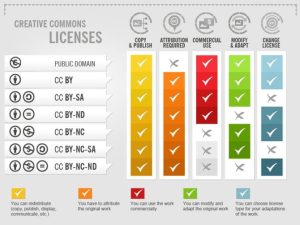William Perrenod
Creative Commons licenses give everyone from individual creators to large institutions a standardized way to grant the public permission to use their creative work under copyright law. From the reuser’s perspective, the presence of a Creative Commons license on a copyrighted work answers the question, What can I do with this work?
The four Creative Commons elements (Attribution, ShareAlike, Non-Commercial, and No Derivatives) combine in different ways to form six distinct licenses. The hierarchy of these licenses moves from least restrictive (CC BY) to most restrictive (CC BY-NC-ND), with each successive license adding more limitations.[1]
Click on a license to identify how to use a creator’s CC-licensed work.
The figure below shows a good overview of what each license permits you to do. Click the image to enlarge it.
Figure source: “What are Creative Commons licenses?” by Foter (CC-BY-SA) / Cropped from original.
Remember, anyone can add a CC license to their content themselves. To help you work out which license is right for you, CC provides an interactive CC Chooser to help you decide. If you are new to CC licenses, become familiar with the considerations for licensors.
Test your CC Licence knowledge

